
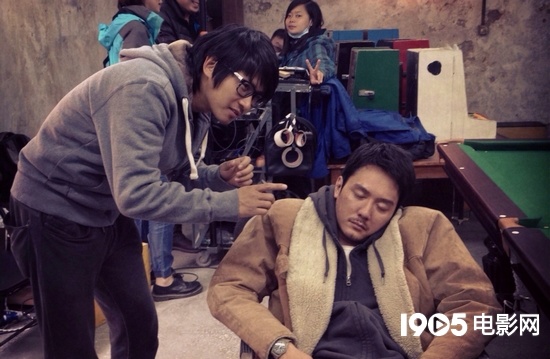
Han Han told William Feng a play.
next page Tailor-made: What do your consumers need?


next page Tailor-made: What do your consumers need?

Special feature of 1905 film network He is a "literary youth", calm, restrained and affectionate; He is a "national first love", a gentle, modest and charming son.From, to, to, he is favored by the famous director.How many actors envy her acting career.But in fact, the frustration that is not cared for by fate is his background color.
His parents divorced, and his father died suddenly. His childhood experiences were sad and lonely, and where will you go had plenty of loneliness and pain engraved in his bones.
From the beginning, his experience was a little more sad and painful than others.

At first, on the road of chasing dreams, there were more disappointments and regrets.
Zhang Yimou’s, her, and her all made him almost ecstatic about getting the opportunity, but in the end they were all replaced;Huang Xuan tasted the bitterness of life prematurely.
When talking about the past, Huang Xuan said: "Some things you may think are yours, but they may not really belong to you. When you don’t necessarily try your best to fight for some things, it shoots you an arrow of luck."
Three years ago, the director who left only the back of Huang Xuan in his old work, three years later, he found Huang Xuan with his script.
Lou Ye said, "You have the temperament of a pony."
The pony who can’t get close to the light is like Huang Xuan who has experienced loneliness and sadness, so he knows the lonely mood in the dark world better.
In order to play this role well, he went to a school for the blind, ate and lived with them, observed their eye state and behavior, and wore an eye patch to experience the world of the blind every day.
Under Huang Xuan’s almost calm and restrained interpretation, the pony with stubborn temperament under the weak appearance is unforgettable.

Just like the pony in the movie, from seeing to seeing, and then regaining the light, Massage lit up his acting career and split the thorns of his life.
Huang Xuan’s charming light has been seen and appreciated by more and more people.
In the director’s TV series "Red Sorghum", he is Jiu-Er’s first love Zhang Junjie. His sincere and clean eyes and bookish look are the teenagers in many people’s dreams.
He starred in the TV series "legend of miyue". Huang Xie, the spring Shen Jun, was the first love of Miyue (ornaments), and his clean temperament was well received by the audience.
Later, Huang Xuan appeared in the film directed by Xu Anhua. At the end of the film, he played Luo Binji, walking in the devastated street, chewing a piece of candy in his mouth, and suddenly burst into tears, grabbing the heartstrings of the audience.

In 2017, Huang Xuan ushered in another sublimation in his career.
He is Liu Feng, the "living Lei Feng" in the art troupe. His pure heroism in his youth and the vicissitudes of life after middle age have exhausted the elegy of his lost youth.
He transformed himself into a romantic and emotional poet of the Tang Dynasty, and spent five months wearing robes, drinking and reciting poems, turning himself into Bai Juyi who wrote the Song of Eternal Sorrow 3.
In this Friday’s broadcast, Huang Xuan changed his normal state, playing the undercover tough guy Lin Kai, and let everyone see his fortitude and blood.

When filming "extraordinary mission", Huang Xuan’s foot was injured and swollen so that he couldn’t put on his shoes because his motorcycle braked too early, but he didn’t delay a day, and the painful trick was finished.

Extraordinary mission’s careful interpretation made him make his mark in action movies for the first time, and he won the Best Action Newcomer Award in the 3rd Jackie Chan Action Movie Week.
However, he was hot, and then he took several workplace dramas.
The fast-paced shooting of TV series makes it difficult for actors to have time to ponder and precipitate.
"Exaggerated" and "greasy", under the chaotic plot and unattractive characters, the voice of the workplace drama "Perfect Relationship" being questioned is pushed to the forefront.

In those years, Huang Xuan experienced peaks and valleys, but "no matter the burden of honor or the negative burden, we have to unload it. Try to stay fresh, curious, nervous, uneasy and awe as you did when you first went to film. "
Later, in the TV series Minning Town, Huang Xuan played the role of "Ma Defu", a poverty alleviation cadre, who worked tirelessly to change the lives of the villagers and had no regrets and touched countless audiences.

Huang Xuan, who is a native of Lanzhou, Gansu Province, speaks an authentic dialect in the play, which is full of affectionate interpretation, as if he were the person who came out of that era.

In the TV series "The Wind Rises in Luoyang", Gao Bingzhu, who is humble but ambitious, and Huang Xuan’s tense interpretation mix the inner resentment of the characters with endless regret and nostalgia.
After returning to the big screen, following the collaboration of Huang Xuanhe in the movie "Youth", Huang Xuan played the role of Sui Dongfeng, who had been wandering for half a life, and performed an ordinary love story of "only loving one person in his life".
In the poem, Shi Ruhong, a rocket engine designer who plays the role of "writing poems in the sky", vividly shows the spirit of a generation of astronauts who silently contribute, overcome difficulties and give up their families for everyone.
In the movie, Huang Xuan shaved his head and played the revolutionary Li Da and his wife. The role of Li Da let us see the glory of the revolutionaries again.
Mao Anying, played by Huang Xuan, died for his country. In the film, he firmly looked ahead and showed his indomitable warrior demeanor.
All these prove that the old Huang Xuan is back.
Counting down, Huang Xuan’s father has left him for 14 years, and this year happens to be the 14th year of Huang Xuan’s debut.
From supporting role to leading role, from unknown to famous, he has been drifting in the entertainment circle with a low-key attitude.
It is those sadness and pain, those tears and sweat, and the stormy course of grinding a sword for ten years that made his medal.
On the afternoon of December 17th (Friday), the movie channel will broadcast "extraordinary mission" starring Huang Xuan. Let’s watch the artistic male god incarnate as an undercover tough guy and stage a thrilling anti-drug hot war!
Brief introduction of Comrade Wang Weizhong
Wang Weizhong, male, Han nationality, born in March 1962, was born in Shuozhou, Shanxi Province. He joined the work in April 1987 and joined the Communist Party of China (CPC) in October 1983. He graduated from Tsinghua University, majoring in management science and engineering. He holds a postgraduate degree and a doctorate in management, and is a researcher. He is currently deputy secretary of Guangdong Provincial Party Committee and secretary of Shenzhen Municipal Party Committee.
From September 1979 to September 1984, he studied water resources engineering in Tsinghua University Water Conservancy Engineering Department.
From September 1984 to April 1987, he was a graduate student majoring in engineering hydrology and water resources in the Institute of Water Resources, Research Institute of Water Resources and Hydropower Research, Ministry of Water Resources and Electric Power.
From April 1987 to July 1988, he was a cadre of the Water Resources Office of the Ministry of Water Resources and Electric Power;
From July 1988 to August 1991, he was a cadre and chief clerk of the Planning Department of the Water Resources Department of the Ministry of Water Resources (during the period: from January 1990 to August 1991, he was seconded to the Social Development Science and Technology Department of the State Science and Technology Commission);
From August 1991 to May 1992, he was the chief member of the Resources and Environment Department of the Social Development Science and Technology Department of the State Science and Technology Commission;
From May 1992 to August 1994, Deputy Director of the Comprehensive Resources Division of the Social Development Science and Technology Department of the State Science and Technology Commission;
From August 1994 to July 1998, he was the Director of the Eco-environment Division of the Social Development Science and Technology Department of the State Science and Technology Commission (during the period: from March 1995 to December 1995, he was a visiting analyst at the National Climate Change Research Office of the US Department of Energy);
From July 1998 to March 1999, acting director of China 21st Century Agenda Management Center and Life Science and Technology Development Center (director level);
From March 1999 to December 2001, Director of China Agenda 21 Management Center and Life Science and Technology Development Center of the Ministry of Science and Technology (deputy bureau level);
From December 2001 to March 2006, Director of China 21st Century Agenda Management Center of the Ministry of Science and Technology (director level) (during the period: from February 2004 to February 2006, he was appointed as the Standing Committee Member and Deputy Mayor of Zhaotong Municipal Committee);
From March 2006 to April 2010, Director of Conditional Finance Department and Scientific Research Conditions and Finance Department of the Ministry of Science and Technology (during the period: from May 1999 to July 2006, Tsinghua University School of Public Administration studied management science and engineering, and obtained a doctorate in management; From March 2008 to July 2008, the Central Party School trained a class of young and middle-aged cadres);
From April 2010 to September 2014, he served as deputy minister of the Ministry of Science and Technology and member of the party group (during the period: from August 2012 to December 2012, he was a senior researcher at the Kennedy School of Government of Harvard University);
September 2014-August 2015, member of the Standing Committee of Shanxi Provincial Party Committee and Secretary General;
August 2015-October 2016, member of the Standing Committee of Shanxi Provincial Party Committee, Secretary-General, and Secretary of the Working Committee of Provincial Organs (concurrently);
October 2016-November 2016, member of the Standing Committee of Shanxi Provincial Party Committee, Secretary-General, Secretary of Working Committee of Provincial Organs (concurrently), Secretary of Taiyuan Municipal Party Committee;
From November 2016 to March 2017, member of the Standing Committee of Shanxi Provincial Party Committee and secretary of Taiyuan Municipal Party Committee;
From March 2017 to April 2017, member of the Standing Committee of Guangdong Provincial Party Committee and secretary of Shenzhen Municipal Party Committee;
April 2017-December 2018, member of the Standing Committee of Guangdong Provincial Party Committee, secretary of Shenzhen Municipal Party Committee, and first secretary of Shenzhen Garrison Committee of Guangdong Province;
Since December 2018, Deputy Secretary of Guangdong Provincial Party Committee, Secretary of Shenzhen Municipal Party Committee and First Secretary of Shenzhen Garrison Committee of Guangdong Province.
Alternate member of the 19th Central Committee and representative of the 19th Party Congress;
Member of the 12th Provincial Party Committee and representative of the 12th Provincial Party Congress.
Brief introduction of Comrade Qin Weizhong
Qin Weizhong, male, Han nationality, born in July 1971, Yulin, Guangxi, joined the work in July 1996, and joined the Communist Party of China (CPC) in June 2001. He graduated from the Department of Chemical Engineering in Tsinghua University with a postgraduate degree, a doctorate in engineering and a senior engineer. He is currently the deputy secretary of Shenzhen Municipal Committee, deputy mayor, acting mayor and party secretary of the municipal government.
From September, 1988 to September, 1993, he studied in Polymer Chemical Engineering Department of Tsinghua University and Electronics and Computer Technology Department of Automation Department.
From September, 1993 to July, 1996, he was a master of polymer materials in Tsinghua University Department of Chemical Engineering.
From July, 1996 to December, 1998, China Petrochemical Corporation served as assistant engineer and engineer in the Far Planning Department of Planning Minister;
From December 1998 to February 2000, deputy director of the Far Planning Department of the Development Planning Department of China Petrochemical Group Corporation;
From February 2000 to February 2002, Director of the Chemical Planning Division of the Development Planning Department of China Petrochemical Co., Ltd.;
From February 2002 to October 2004, Director of Chemical Planning Division, Development Planning Department, China Petrochemical Co., Ltd. (during the period: from July 2003 to July 2004, he was appointed as Assistant Manager of Beijing Yanshan Branch);
From October 2004 to May 2007, Deputy Director of Development Planning Department of China Petrochemical Co., Ltd.;
From May 2007 to May 2008, Deputy Director of Development Planning Department of China Petrochemical Co., Ltd. and Director of China Petrochemical New Energy Office;
From May 2008 to July 2010, sinopec group (China Petrochemical Co., Ltd.) served as Deputy Director of Development Planning Department and Director of China Petrochemical New Energy Office;
From July 2010 to March 2017, he was the director and deputy secretary of the Party Committee of Jiujiang Petrochemical General Factory of China Petrochemical Company, and the general manager of Jiujiang Branch of China Petrochemical Co., Ltd. (from September 2007 to July 2015, he studied as an on-the-job graduate student majoring in chemical engineering and technology in the Department of Chemical Engineering of Tsinghua University, and obtained a doctorate in engineering);
From March 2017 to March 2019, deputy general manager of China Petroleum Corporation (renamed China Petroleum Corporation in December 2017), director of China Petroleum Corporation (June 2017) and chairman of China Petroleum Engineering Corporation (September 2017);
From March 2019 to April 2021, deputy governor of Guangdong Province and member of the party group;
Since April 2021, he has been deputy secretary of Shenzhen Municipal Committee of Guangdong Province, deputy mayor, acting mayor and party secretary of the municipal government.
Brief introduction of Comrade Zheng Ke
Zheng Ke, male, Han nationality, born in September 1966, Maoming, Guangdong, joined the work in June 1989, and joined the Communist Party of China (CPC) in March 1987. He graduated from Sun Yat-sen University with a bachelor’s degree in philosophy. He is currently the deputy secretary of Shenzhen Municipal Committee.
From September 1985 to June 1989, he studied philosophy in the Department of Philosophy of Sun Yat-sen University.
From June 1989 to January 1990, he was a cadre of the directly under the authority Commission for Discipline Inspection of the Guangdong Provincial Party Committee;
From January 1990 to January 1991, he was a cadre of the Party Committee Office of Baitu Town, Gaoyao County, Zhaoqing City, Guangdong Province;
From January 1991 to July 1991, he was a member of the Commission for Discipline Inspection of directly under the authority, Guangdong Provincial Party Committee;
From July 1991 to November 1992, he was a member of the Youth League Committee of directly under the authority, Guangdong Provincial Party Committee and a deputy-level cadre;
November 1992-July 1994, Deputy Secretary of the Youth League Committee of directly under the authority, Guangdong Provincial Party Committee (director level);
From July 1994 to June 1998, he served as the director of the local cadre department of the Organization Department of Guangdong Provincial Party Committee (during the period: from August 1996 to January 1997, he served as a member of the grassroots organization construction in Kuihuang Village, Nankou Town, Meixian County, Meizhou City, Guangdong Province);
From June 1998 to December 2000, he was an assistant researcher at the local cadre department of the Organization Department of Guangdong Provincial Party Committee;
From December 2000 to January 2002, he served as deputy director of the Third Division of the Organization Department of Guangdong Provincial Party Committee;
From January 2002 to July 2004, Deputy Director of the Public Election Office of the Organization Department of Guangdong Provincial Party Committee (in the post);
From July 2004 to July 2007, Director of the Organization Department of the Organization Department of Guangdong Provincial Party Committee;
From July, 2007 to April, 2009, he was the organizer and director of the Organization Department of the Deputy Department of the Organization Department of Guangdong Provincial Party Committee (during the period: from May, 2008 to June, 2008, he attended the seminar on "Promoting Party Building with the Spirit of Reform and Innovation" at Pudong Cadre College);
From April 2009 to July 2012, he was the deputy director-level organizer of the Organization Department of Guangdong Provincial Party Committee;
From July 2012 to February 2015, deputy director of the Organization Department of Guangdong Provincial Party Committee;
February 2015-May 2015, member of the Standing Committee of Shenzhen Municipal Committee of Guangdong Province;
From May 2015 to December 2018, he served as member of the Standing Committee of Shenzhen Municipal Committee of Guangdong Province, Minister of Organization Department, President of Party School, Dean of Shenzhen Administration College, Dean of Institute of Socialism, and Dean of Municipal Talent Training Institute;
From December 2018 to October 2019, Deputy Secretary of Shenzhen Municipal Committee of Guangdong Province, Minister of Organization Department, President of Party School, Dean of Shenzhen Administration College, Dean of Institute of Socialism, and Dean of Municipal Talent Training Institute;
From October 2019 to present, Deputy Secretary of Shenzhen Municipal Committee of Guangdong Province (during this period: from September 2019 to January 2020, he participated in the 47th training class for young cadres at the Central Party School (National School of Administration)).
Representative of the 12th provincial party congress.
Brief introduction of Comrade Ai Xuefeng
Ai Xuefeng, male, Han nationality, born in August 1965, from Anlu, Hubei Province, joined the work in August 1987 and joined the Communist Party of China (CPC) in December 1984. He graduated from graduate department, People’s Bank of China with a postgraduate degree and a master’s degree in economics. He is currently a member of the Standing Committee of Shenzhen Municipal Committee, deputy mayor of the municipal government and party group.
From September 1983 to July 1987, he studied computer science in the Department of Computer Science and Engineering of Northeast Institute of Technology.
From August 1987 to September 1989, he was an assistant engineer of Liaoning Printing Research Institute.
From September, 1989 to February, 1992, China People’s Bank, graduate department, majoring in monetary banking;
From February 1992 to May 1992, he was a cadre of the head office of China Construction Bank;
From May 1992 to December 1995, he served as Deputy Director of Division I of the State Council Hong Kong and Macao Affairs Office;
From December 1995 to October 1998, Deputy Director of the Hong Kong Economic Department of the the State Council Hong Kong and Macao Affairs Office;
From October 1998 to December 2001, Deputy Director of the Hong Kong Economic Department of the the State Council Hong Kong and Macao Affairs Office;
From December 2001 to March 2004, Deputy Director of the Political Research Department of the State Council Hong Kong and Macao Affairs Office;
From March 2004 to November 2010, Director of the Political Research Department of the State Council Hong Kong and Macao Affairs Office;
From November 2010 to February 2011, deputy secretary and acting mayor of Shaoguan Municipal Committee of Guangdong Province;
From February 2011 to April 2015, deputy secretary and mayor of Shaoguan Municipal Committee of Guangdong Province;
Since April 2015, deputy mayor and member of the party group of Shenzhen Municipal Government of Guangdong Province.
Brief introduction of Comrade Liu Liansheng
Liu Liansheng, male, Han nationality, born in September 1964 in Shaoyang, Hunan Province, joined the work in July 1987 and joined the Communist Party of China (CPC) in November 1986. He graduated from the School of Economics and Business of South China Agricultural University with a master’s degree in agricultural economics and management. He is currently a member of the Standing Committee of Shenzhen Municipal Committee, secretary of the Municipal Discipline Inspection Commission, deputy director and acting director of the Municipal Supervision Commission.
From September 1982 to July 1987, he studied veterinary medicine in the Department of Veterinary Medicine of Hunan Agricultural College.
From July 1987 to October 1988, he was a cadre of the Animal Husbandry and Fisheries Bureau of Shaoyang County, Hunan Province;
From October 1988 to March 1989, he was a cadre of the Youth League Committee of Shaoyang County, Hunan Province;
From March 1989 to September 1991, deputy director of the Office of Discipline Inspection of Shaoyang County, Hunan Province;
From September 1991 to July 1994, he studied agricultural economics and management in the School of Economics and Business of South China Agricultural University.
From July 1994 to August 1997, he served as deputy director of the Guangdong Provincial Commission for Discipline Inspection;
From August 1997 to March 2002, he was the chief member of the Guangdong Provincial Commission for Discipline Inspection;
From March 2002 to April 2004, he served as deputy director-level discipline inspector of Guangdong Provincial Commission for Discipline Inspection;
From April 2004 to November 2004, Director of the Case Management Office of the General Office of the Guangdong Provincial Commission for Discipline Inspection;
From November 2004 to September 2007, he was the deputy director of the case management office of the Guangdong Provincial Commission for Discipline Inspection (during the period: from September 2005 to January 2006, he studied in Class One, Middle School, Guangdong Provincial Party School);
From September 2007 to January 2010, deputy director of the Policy and Regulation Research Office of the Guangdong Provincial Commission for Discipline Inspection;
From January 2010 to May 2012, he was the deputy director of the Party Style and Clean Government Construction Office of the Guangdong Provincial Commission for Discipline Inspection;
From May 2012 to December 2013, he served as member of the Standing Committee of the Guangdong Provincial Commission for Discipline Inspection and deputy director of the Party’s work style and clean government construction office;
December 2013-October 2015, member of the Standing Committee of the Guangdong Provincial Commission for Discipline Inspection;
October 2015-January 2018, member of the Standing Committee of Guangzhou Municipal Committee of Guangdong Province and secretary of the Municipal Commission for Discipline Inspection;
From January 2018 to April 2021, he was a member of the Standing Committee of Guangzhou Municipal Committee of Guangdong Province, secretary of the Municipal Commission for Discipline Inspection, and director of the Municipal Supervision Committee;
Since April 2021, he has been a member of the Standing Committee of Shenzhen Municipal Committee of Guangdong Province, secretary of the Municipal Discipline Inspection Commission, deputy director and acting director of the Municipal Supervision Commission.
Member of the 12th Provincial Discipline Inspection Commission.
Brief introduction of Comrade Feng Ling
Feng Ling, female, Han nationality, born in Fengshun, Guangdong Province in September 1969, joined the work in July 1991, and joined the Communist Party of China (CPC) in May 1995. She graduated from Guangdong Academy of Social Sciences with a postgraduate degree in political economy, and is a lawyer. He is currently a member of the Standing Committee of Shenzhen Municipal Committee, Minister of United Front Work Department and Deputy Secretary of the Party Group of CPPCC.
From October 1989 to July 1991, he was a secondary school student majoring in law in Guangdong Judicial School.
From July 1991 to May 1994, he worked in Fengshun Law Firm, Meizhou City, Guangdong Province (during the period: he passed the national lawyer qualification examination in August 1992 and obtained the lawyer qualification);
From May 1994 to October 1998, he served as deputy secretary and secretary of Fengshun County Committee of the Communist Youth League in Meizhou City, Guangdong Province (during the period: from September 1992 to July 1995, he studied in the correspondence junior college class of law major in Fengshun Branch of Guangdong Radio and TV University);
From October 1998 to March 2003, he served as deputy secretary of the Meizhou Municipal Committee of the Communist Youth League of Guangdong Province (during the period: from September 1998 to July 2001, he studied in the postgraduate class of political economy of the Provincial Academy of Social Sciences);
From March 2003 to July 2004, member of the Standing Committee of Jiaoling County Committee, Meizhou City, Guangdong Province, and Minister of Organization Department;
From July 2004 to March 2006, Deputy Secretary of Jiaoling County Committee of Meizhou City, Guangdong Province and Minister of Organization Department (during the period: from September 2002 to September 2005, he studied in the undergraduate course of law major of School of Law, Network Education College of Sichuan University);
From March 2006 to March 2007, Party Secretary and Chairman of Meizhou Women’s Federation of Guangdong Province;
From March, 2007 to December, 2008, she worked as a researcher in the Women’s Staff Department of Guangdong Federation of Trade Unions.
From December 2008 to May 2010, she served as the Minister of Women Workers’ Department of Guangdong Provincial Federation of Trade Unions (during the period: from March 2009 to July 2009, she studied in the training class for young and middle-aged cadres at the Party School of the Provincial Party Committee);
From May 2010 to April 2012, Party Secretary and Executive Vice President of Guangdong Red Cross Society (during the period: studying in the municipal and departmental classes of the Party School of the Provincial Party Committee from February 2012 to April 2012);
From April 2012 to March 2017, member of the Standing Committee of Shantou Municipal Committee of Guangdong Province and Minister of Organization Department;
From March 2017 to February 2018, Party Secretary of Guangdong Women’s Federation;
From February 2018 to September 2020, Party Secretary and Chairman of Guangdong Women’s Federation;
From September 2020 to April 2021, Deputy Secretary of the Working Committee of directly under the authority, Guangdong Province (in charge of daily work and director level);
Since April 2021, he has been a member of the Standing Committee of Shenzhen Municipal Committee of Guangdong Province, director of the United Front Work Department, and deputy secretary of the CPPCC Party Group.
Representatives of the 19th Party Congress;
Member of the 12th Provincial Party Committee and representative of the 12th Provincial Party Congress.
Brief introduction of Comrade Huang Min
Huang Min, male, Han nationality, born in August 1963, from Puning, Guangdong Province, joined the work in August 1986, and joined the Communist Party of China (CPC) in December 1985. He graduated from Southwest Jiaotong University with a major in transportation planning and management. He holds a postgraduate degree and a doctorate, and is an engineer. He is currently a member of the Standing Committee of Shenzhen Municipal Committee, a member of the Party Group of the Municipal Government, the Party Secretary and Director of the Management Committee of Qianhai Shekou Free Trade Zone, the Secretary of the Party Working Committee of Qianhai Cooperation Zone and the Director of Qianhai Administration.
From August 1982 to August 1986, he studied port construction engineering in the Department of Civil Engineering of Dalian Institute of Technology.
From August 1986 to November 1987, he worked as a technician and assistant engineer in Zhenhua Harbor Enterprise Co., Ltd., Shenzhen Shipping Corporation, Guangdong Province;
From November 1987 to December 1996, he was a cadre of the Communications Office of Shenzhen Municipal Government, a member of the Municipal Transportation Bureau, an engineer, a deputy director (April 1991) and a director (August 1993);
From December 1996 to August 2001, Deputy Director and Director of the Transportation Department of Shenzhen Municipal Transportation Bureau, Guangdong Province (September 1999) (during the period: from August 1998 to January 1999, he attended the third seminar of the Organization Department of Shenzhen Municipal Committee of Guangdong Province in Hong Kong; From December 1998 to January 2001, he was a master of transportation engineering in the School of Transportation, Southwest Jiaotong University);
From August, 2001 to January, 2008, he was a member of the Party Group and Deputy Director of Shenzhen Municipal Bureau of Transportation (Municipal Port Authority) in Guangdong Province (during this period: from June, 2001 to September, 2001, the Organization Department of Shenzhen Municipal Committee of Guangdong Province was selected to participate in the eighth batch of discipline inspection practice exercises of the Municipal Commission for Discipline Inspection);
From January 2008 to August 2009, Party Secretary and Director of Shenzhen Transportation Bureau (Municipal Port Authority) of Guangdong Province (March 2008) and Director of the Office of the Municipal Airport Management Committee (March 2009);
From August 2009 to June 2010, he served as deputy director (deputy director) of Shenzhen Municipal Transportation Committee (Municipal Port Authority), deputy secretary of the party group and director of the office of the Municipal Airport Management Committee;
June 2010-July 2010, Deputy Director (Deputy Director) and Party Secretary of Shenzhen Municipal Transportation Committee (Municipal Port Authority);
From July 2010 to July 2015, Director (Director) and Party Secretary of Shenzhen Municipal Transportation Committee (Municipal Port Authority) (during which: cheung kong graduate school of business executive master of business administration studied professionally from October 2010 to November 2012; From March 2002 to December 2014, Ph.D. students majoring in transportation planning and management at Southwest Jiaotong University studied);
From July 2015 to September 2015, Party Secretary of Shenzhen Municipal Transportation Committee (Municipal Port Authority), Secretary of Baoan District Committee, Director of the Standing Committee of District People’s Congress and Party Secretary (August 2015);
From September 2015 to October 2016, Secretary of Baoan District Committee of Shenzhen City, Guangdong Province, Director of the Standing Committee of the District People’s Congress and Secretary of the Party Group;
From October 2016 to August 2017, Secretary of Baoan District Committee of Shenzhen City, Guangdong Province;
From August 2017 to September 2017, deputy mayor of Shenzhen Municipal Government of Guangdong Province, member of the party group, and secretary of Baoan District Committee;
From September 2017 to July 2020, deputy mayor of Shenzhen Municipal Government of Guangdong Province, member of the party group, and chairman of the Municipal Disabled Persons’ Federation (June 2018);
From July 2020 to August 2020, he was a member of the Standing Committee of Shenzhen Municipal Committee of Guangdong Province, deputy mayor of the municipal government, member of the party group, and chairman of the Municipal Disabled Persons’ Federation; From August 2020 to August 2020, he was a member of the Standing Committee of Shenzhen Municipal Committee of Guangdong Province, a member of the party group of the municipal government, and the chairman of the Municipal Disabled Persons’ Federation;
From August 2020 to January 2021, he was a member of the Standing Committee of Shenzhen Municipal Committee of Guangdong Province, a member of the party group of the municipal government, the party secretary and director of the management committee of Qianhai Shekou Free Trade Zone, the secretary of the Party Working Committee of Qianhai Cooperation Zone, the director of Qianhai Administration Bureau and the chairman of the Municipal Disabled Persons’ Federation;
Since January 2021, he has been a member of the Standing Committee of Shenzhen Municipal Committee of Guangdong Province, a member of the party group of the municipal government, the party secretary and director of the management committee of Qianhai Shekou Free Trade Zone, the secretary of the Party Working Committee of Qianhai Cooperation Zone and the director of Qianhai Administration.
Representative of the 12th provincial party congress.
Brief introduction of Comrade Yu Xinguo
Yu Xinguo, male, Han nationality, born in February 1964, Wenzhou, Zhejiang Province, joined the work in August 1982, and joined the Communist Party of China (CPC) in October 1984. He graduated from the Party School of the Provincial Party Committee with a postgraduate degree in economics. He is currently a member of the Standing Committee of Shenzhen Municipal Committee and secretary of the Political and Legal Committee of Shenzhen Municipal Committee.
From September 1980 to August 1982, he studied journalism in Zhejiang Radio and Television School.
From August 1982 to August 1985, he was a member of the Office of Zhejiang Provincial Public Security Bureau;
From August 1985 to October 1986, deputy director of Shaoxing County Public Security Bureau, Zhejiang Province;
From October 1986 to April 1987, he served as deputy director of the research office of Zhejiang Provincial Public Security Department;
From April 1987 to June 1991, he served as deputy director and director of the Secretariat of the General Office of the Ministry of Public Security (May 1989);
From June 1991 to February 1993, Deputy Secretary of the General Office of the Ministry of Public Security;
From February 1993 to November 1993, he was the secretary of the General Office of the Ministry of Public Security;
From November 1993 to September 1995, Deputy Director of Futian Branch of shenzhen public, Guangdong Province (during the period: from September 1992 to August 1994, the management major of the Management Cadre College of the Ministry of Public Security studied);
From September 1995 to December 1995, political commissar of Futian Branch of shenzhen public, Guangdong Province;
From December 1995 to December 1999, he was a political commissar, deputy secretary of the Party Committee and secretary of the discipline inspection of Futian Branch of shenzhen public, Guangdong Province (during the period: from September 1995 to July 1998, he studied Party Economics in Guangdong Province and obtained a postgraduate degree);
From December 1999 to August 2001, Assistant Director shenzhen public;
From August 2001 to July 2009, shenzhen public, deputy director and member of the Party Committee;
From July 2009 to December 2009, Deputy Secretary-General of Shenzhen Municipal Government of Guangdong Province (director level) and member of the Party Group of the General Office of the Municipal Government;
From December 2009 to August 2010, Deputy Secretary-General of Shenzhen Municipal Government of Guangdong Province, member of the Party Group of the General Office of the Municipal Government, and director of the Office of the Leading Group for Comprehensive Control of Anti-smuggling of the Municipal Government;
From August 2010 to November 2011, he served as Deputy Secretary-General of Shenzhen Municipal Government of Guangdong Province and Director of the Office of the Leading Group for Comprehensive Management of Combating Smuggling of the Municipal Government;
From November 2011 to January 2012, he served as deputy secretary of Nanshan District Committee of Shenzhen City, Guangdong Province, deputy head of the district government, acting district head and party secretary;
From January 2012 to August 2015, deputy secretary of Nanshan District Committee of Shenzhen City, Guangdong Province, district head and party secretary;
From August 2015 to January 2017, secretary of the Party Working Committee of Longhua New District, Shenzhen City, Guangdong Province (during the period: head of the preparatory group of Longhua District Committee from November 2016 to January 2017);
From January 2017 to June 2018, Secretary of Longhua District Committee of Shenzhen City, Guangdong Province;
June 2018-December 2018, member of the Standing Committee of Shenzhen Municipal Committee of Guangdong Province, secretary of Longhua District Committee;
Since December 2018, member of the Standing Committee of Shenzhen Municipal Committee of Guangdong Province and secretary of the Political and Legal Committee of the Municipal Committee.
Representative of the 12th provincial party congress.
Brief introduction of Comrade Cheng Buyi
Cheng Buyi, male, Han nationality, born in June 1973, chaozhou people, Guangdong Province, joined the work in July 1996, and joined the Communist Party of China (CPC) in August 1999. He graduated from Tsinghua University with a university degree and a master’s degree in public administration. He is currently a member of the Standing Committee of Shenzhen Municipal Committee, Minister of Organization and President of Party School.
From September 1992 to July 1996, he studied industrial foreign trade in the School of Management, Beijing Institute of Technology.
From July 1996 to February 2001, he was a member of the Policy Research Office of Guangdong Provincial Party Committee;
From February 2001 to September 2003, deputy director of the Policy Research Office of Guangdong Provincial Party Committee;
From September 2003 to September 2006, he served as the director of the Policy Research Office of Guangdong Provincial Party Committee (during the period: from March 2002 to July 2005, he studied public administration in the School of Public Administration of Tsinghua University and obtained a master’s degree in public administration);
From September 2006 to February 2009, deputy director of the Comprehensive Research Division of the Policy Research Office of Guangdong Provincial Party Committee;
From February 2009 to May 2014, Director of the Comprehensive Research Division of the Policy Research Office of the Guangdong Provincial Party Committee (during the period: from December 2010 to December 2011, he served as Assistant to the Mayor of Jiangmen City, Director of the Municipal Tourism Bureau and Secretary of the Party Group; From August 2012 to December 2012, the first class of Zhongqing in the Party School of the Provincial Party Committee studied);
From May 2014 to June 2017, deputy director of the Political Research Office of Guangdong Provincial Party Committee;
June 2017-April 2018, member of the Standing Committee of Zhaoqing Municipal Committee of Guangdong Province, director of the Organization Department, and director of the Party School (Municipal Administration College) of the Municipal Party Committee;
From April 2018 to September 2018, he was a member of the Organization Department of Guangdong Provincial Party Committee;
From September 2018 to October 2019, deputy director of the Organization Department of Guangdong Provincial Party Committee;
October 2019 to present, member of the Standing Committee of Shenzhen Municipal Committee of Guangdong Province, Minister of Organization Department, President (Dean) of Party School (Shenzhen Administration College, Shenzhen Institute of Economics and Management), Dean of Shenzhen Reform and Opening-up Cadre College (September 2020).
Brief introduction of Comrade Xingping Nie
Xingping Nie, male, Han nationality, born in July 1969, Shicheng, Jiangxi, joined the work in July 1991, and joined the Communist Party of China (CPC) in November 1999. He graduated from Fudan University with a postgraduate degree and a master’s degree in economics. He is currently a member of the Standing Committee of Shenzhen Municipal Committee, deputy mayor of the municipal government and party group.
From September 1987 to July 1991, Peking University Economic Management Department studied national economic management;
From July 1991 to November 1992, he was in charge of the production department of Shenzhen Tongguang-Nortel Co., Ltd.;
From November 1992 to October 1993, he was a cadre of the securities business department of China Merchants Bank;
From October 1993 to April 1996, he was a cadre of CITIC Group Zhongda Investment Management Co., Ltd.;
From April, 1996 to January, 2001, he was a cadre and deputy director of the General Office of Shenzhen Municipal Government (July, 1996), deputy director and director of the General Office (August, 1998).
From January 2001 to December 2004, Deputy Director of Social Affairs Department and Deputy Director of General Affairs Department of Shenzhen Municipal Government Office, Guangdong Province (July 2003) (during which: from September 1998 to July 2001, he studied in the on-the-job postgraduate class of finance major of Fudan University);
From December 2004 to November 2005, Director of the General Office of Shenzhen Municipal Government, Guangdong Province;
From November 2005 to December 2013, he served as deputy director and member of the party group of the General Office of Shenzhen Municipal Government of Guangdong Province;
From December 2013 to August 2015, Director of the General Office of the Shenzhen Municipal Government of Guangdong Province and Deputy Secretary of the Party Group;
From August 2015 to December 2017, deputy secretary of Luohu District Committee of Shenzhen City, Guangdong Province, acting district head and district head of the district government (September 2015);
From December 2017 to June 2018, the director of the Shenzhen Development and Reform Commission of Guangdong Province, the director (January 2018), the party secretary, and the head of the Luohu District Government;
From June 2018 to January 2019, director and party secretary of Shenzhen Development and Reform Commission, Guangdong Province;
From January 2019 to March 2020, he served as director of the Shenzhen Development and Reform Commission, secretary of the Party Group, and director of the Guangdong-Hong Kong-Macao Greater Bay Area Construction Leading Group Office of the Municipal Party Committee (Hong Kong and Macao Office of the Municipal Government);
From March 2020 to July 2020, he served as deputy mayor of Shenzhen Municipal Government, member of the Party Group, director of the Municipal Development and Reform Commission, secretary of the Party Group, and director of the Office of the Leading Group for Promoting Guangdong-Hong Kong-Macao Greater Bay Area Construction (Hong Kong and Macao Office of the Municipal Government);
From July 2020 to August 2020, he was the deputy mayor of Shenzhen Municipal Government of Guangdong Province, a member of the party group, and the director of the Municipal Development and Reform Commission;
Since August 2020, he has been the deputy mayor and member of the Party Group of Shenzhen Municipal Government of Guangdong Province.
Brief introduction of Comrade Wang Qiang
Wang Qiang, male, Han nationality, born in October 1965 in Dongyang, Zhejiang Province, joined the work in April 1991 and joined the Communist Party of China (CPC) in December 1985. He graduated from Zhongnan College of Political Science and Law with a master’s degree in civil law and an economist. He is currently member of the Standing Committee of Shenzhen Municipal Committee and Minister of Propaganda Department.
From September 1984 to August 1988, he studied law in the Law Department of Jiangxi University.
From September 1988 to April 1991, he was a master of civil law in Zhongnan College of Political Science and Law.
From April 1991 to January 1994, he was a member of the Labor Inspection Brigade of Shenzhen Labor Bureau, Guangdong Province;
From January 1994 to December 1995, he was the deputy director of Shenzhen Employment Center, Guangdong Province;
From December 1995 to November 1996, he was the head of the Employment Training Section of Shenzhen Labor and Employment Service Center, Guangdong Province;
From November 1996 to November 1997, he was the business manager and deputy manager of the personnel department of Shenzhen Tefa Group.
From November 1997 to July 1998, he served as deputy general manager and director of Shenzhen Tefa Liming Optoelectronics (Group) Co., Ltd.;
From July 1998 to August 2002, he was a member of the Party Committee, deputy general manager and director of Shenzhen Tefa Liming Optoelectronics (Group) Company;
From August 2002 to November 2002, he was a member of the Party Group of Shenzhen Federation of Trade Unions in Guangdong Province;
From November 2002 to August 2006, he was a member and vice chairman of the Party Group of Shenzhen Federation of Trade Unions in Guangdong Province;
From August 2006 to December 2011, he served as member of the Standing Committee of Futian District Committee of Shenzhen City, Guangdong Province and Minister of Propaganda Department (during the period: from November 2008 to January 2011, he studied in the on-the-job master’s class of business administration for senior managers of Guanghua School of Management, Peking University);
From December 2011 to June 2013, Deputy Secretary of Futian District Committee, Secretary of Political and Legal Committee and Director of District Social Work Committee, Shenzhen City, Guangdong Province (April 2012);
From June 2013 to July 2013, he served as deputy secretary of Futian District Committee of Shenzhen City, Guangdong Province, secretary of the Political and Legal Committee, party secretary, deputy district head and acting district head of the district government;
From July 2013 to September 2013, Deputy Secretary of Futian District Committee, Secretary of Political and Legal Committee, Party Secretary and District Head of District Government, Shenzhen City, Guangdong Province;
From September 2013 to August 2015, deputy secretary of Futian District Committee of Shenzhen City, Guangdong Province, party secretary and district head of the district government;
From August 2015 to September 2015, deputy secretary of Nanshan District Committee of Shenzhen City, Guangdong Province, party secretary and acting district head of the district government;
From September 2015 to July 2017, deputy secretary of Nanshan District Committee of Shenzhen City, Guangdong Province, party secretary and district head of the district government;
From July 2017 to September 2017, Secretary of Nanshan District Committee of Shenzhen City, Guangdong Province, Party Secretary and District Head of the District Government;
From September 2017 to July 2020, Secretary of Nanshan District Committee, Shenzhen City, Guangdong Province;
July 2020 to present, member of the Standing Committee of Shenzhen Municipal Committee of Guangdong Province and Minister of Propaganda Department.
Brief introduction of Comrade Zhang Yong
Zhang Yong, male, Han nationality, born in May 1974, Linxian County, Shanxi Province, joined the work in July 1995, and joined the Communist Party of China (CPC) in May 1995. He graduated from architectural and civil engineering of Hunan University with a master’s degree in engineering, a senior engineer and a senior economist. He is currently a member of the Standing Committee of Shenzhen Municipal Committee, deputy mayor of the municipal government and party group.
From September, 1991 to July, 1995, he majored in civil engineering of civil engineering of civil engineering.
From July 1995 to May 2004, he worked as a technician, assistant engineer, engineer, head of planning and operation department and deputy section chief of operation department in Shenzhen Highway Survey and Design Institute of Guangdong Province (August 2000) (during which: from December 2000 to October 2003, he studied in architectural and civil engineering, School of Civil Engineering, Hunan University);
From May 2004 to April 2006, Vice President of Shenzhen Highway Survey and Design Institute, Guangdong Province;
From April 2006 to October 2008, Vice President of Shenzhen Comprehensive Transportation Design and Research Institute, Guangdong Province;
From October 2008 to March 2010, Vice President of Shenzhen Comprehensive Transportation Design and Research Institute, Guangdong Province (presided over the work);
From March 2010 to December 2011, President of Shenzhen Comprehensive Transportation Design and Research Institute, Guangdong Province;
From December 2011 to November 2015, he served as deputy head of the government of Baoan District, Shenzhen City, Guangdong Province and a member of the party group (during the period: from April 2013 to March 2014, he also served as the first secretary of the Party Working Committee of Songgang Street, Baoan District);
From November 2015 to March 2016, deputy director (deputy director) and deputy secretary of the party group of Shenzhen Planning and Land Resources Committee (Municipal Oceanic Administration) of Guangdong Province;
From March 2016 to September 2017, Director (Director) and Party Secretary of Shenzhen Municipal Administration of Work Safety (Municipal Safety Committee Office) of Guangdong Province;
September 2017-October 2017, Secretary of Longgang District Committee of Shenzhen City, Guangdong Province, Director (Director) and Party Secretary of Municipal Work Safety Supervision Administration (Municipal Safety Committee Office);
From October 2017 to July 2020, Secretary of Longgang District Committee of Shenzhen City, Guangdong Province;
From July 2020 to August 2020, the deputy mayor of Shenzhen Municipal Government of Guangdong Province was selected and a member of the party group;
From August 2020 to present, he has been the deputy mayor and member of the Party Group of Shenzhen Municipal Government of Guangdong Province (during this period, he attended the training course for young and middle-aged cadres of the Central Party School < National School of Administration > in the fall semester of 2020).
Brief introduction of Comrade Yang Zhichun
Yang Zhichun, male, Han nationality, born in February 1969 in Xiangyin, Hunan Province, joined the work in November 1987 and joined the Communist Party of China (CPC) in July 1992. He graduated from National University of Defense Technology with a master’s degree in public administration. He is currently a member of the Standing Committee of Shenzhen Municipal Committee and commander of Shenzhen Garrison.
From November 1987 to June 1999, he served as a soldier, technician and instructor in Guangzhou Military Region and Hainan Military Region (during the period: from September 1989 to July 1992, he studied satellite communication in Nanjing Institute of Communication Engineering);
From June 1999 to June 2011, he served as the organization director, deputy captain of the student team and assistant of the key laboratory of national defense science and technology (from September 1997 to July 1999, he studied in a full-time university majoring in political work in Changsha University of Politics;
From March 2002 to March 2005, he was a postgraduate majoring in public administration at National University of Defense Technology);
From June 2011 to June 2013, he was a political commissar of the Fifth Brigade of the College of Basic Education for Commanding Officers of National University of Defense Technology;
From June 2013 to January 2018, deputy dean of the College of Basic Education for Command Officers of National University of Defense Technology;
From January 2018 to September 2020, commander of Meizhou Military Division of Guangdong Province;
From September 2020 to March 2021, commander of Shenzhen Garrison, Guangdong Province;
Since March 2021, he has been a member of the Standing Committee of Shenzhen Municipal Committee of Guangdong Province and commander of Shenzhen Garrison.
CCTV News:According to China Weather Network, recently, due to the influence of subtropical high, there has been a continuous sultry sauna day in the northeast and north China, and the highest temperature in many places has broken historical extremes. It is expected that this round of high temperature weather in the north will gradually weaken and fade on the 5 th. The high temperature has gone up and down. Affected by the rain and the wind and rain brought by the lark, the high temperature range in the south will be significantly reduced today (2 nd) and tomorrow, and it will make a comeback on the 4 th.
The high temperature has gradually weakened since the "sauna" in Northeast China and North China continued for 5 days.
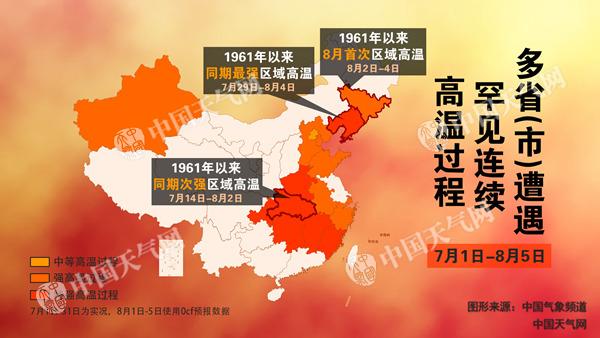
Since the end of July, due to the influence of subtropical high, there has been continuous high temperature weather in northeast and north China, and the air humidity is high, making people feel like a sauna. Yesterday, there was a high temperature in Shenyang, Liaoning Province for the fifth consecutive day. The highest temperatures in Dandong and Dalian reached 37.3℃ and 36.9℃ respectively, setting a meteorological record for extreme values. Temperatures in Beijing, Tianjin and Hebei and Shandong are also above 35℃, which is sultry and unbearable.
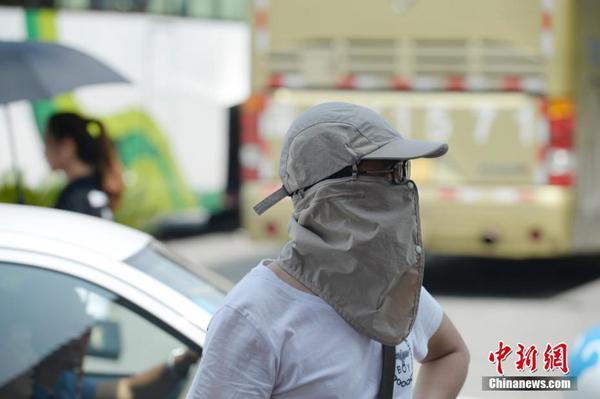
Yesterday, street people in Hohhot wore sunscreen masks to travel. Recently, the meteorological department of Inner Mongolia has continuously issued high-temperature warnings.
In the next few days, the above areas will still accept high temperature "baking inspection". The Central Meteorological Observatory predicts that before August 5, the high temperature in Beijing-Tianjin-Hebei, northern Shandong, central and eastern Inner Mongolia, most of Liaoning and central and southern Jilin will gradually develop, and the high temperature in Beijing-Tianjin-Hebei and Liaoning will last for 3 to 5 days. In this regard, the Central Meteorological Observatory continued to issue a high-temperature yellow warning this morning.
In this round of high temperature process, Shenyang is "outstanding". The highest temperature in Shenyang has exceeded 35℃ for five consecutive days, and the highest temperature will continue at or above 35℃ in the next three days, which is likely to break the record of the highest number of consecutive days of high temperature, which appeared in 1952 and lasted for five consecutive days. At the same time, the highest temperature in Shenyang today may reach 37℃, which will set a new record for the local extreme highest temperature in August (the previous record was 35.7℃). In addition, with the continuous expansion of high temperature, the temperature in Changchun may reach 36℃ on the 3rd, which will not only set a new high this year, but also become the hottest day in the local observation history in August. The high temperature in Changchun in August is very rare, and there has been only one high temperature on August 3, 1968 since it was recorded in 1951.
In addition to the northeast, Beijing-Tianjin-Hebei and northern Shandong will also have high temperatures in the next three days, and the highest temperatures in Beijing, Tianjin, Shijiazhuang and Jinan will remain at 35 C or above. The temperature in North China is high during the day and not low at night, and the lowest temperature is mostly above 26℃, and Tianjin will exceed 28℃. Moreover, due to the high relative humidity, the somatosensory temperature is higher, and the sultry feeling is not inferior to that in the south.
The Central Meteorological Observatory predicts that in five days, the hot weather in the above-mentioned areas in the north will end. This round of high temperature weather lasts for a long time, and the high temperature in some areas breaks the extreme value. People in the above areas need to be prepared for heatstroke prevention and cooling, and try to avoid going out at the hottest noon. If they have to go out, they should take sun protection measures and replenish water in time. Outdoor workers prepare some heatstroke prevention drugs for emergencies.
The high temperature area in the south has been significantly reduced, and it has made a comeback since the 4 th
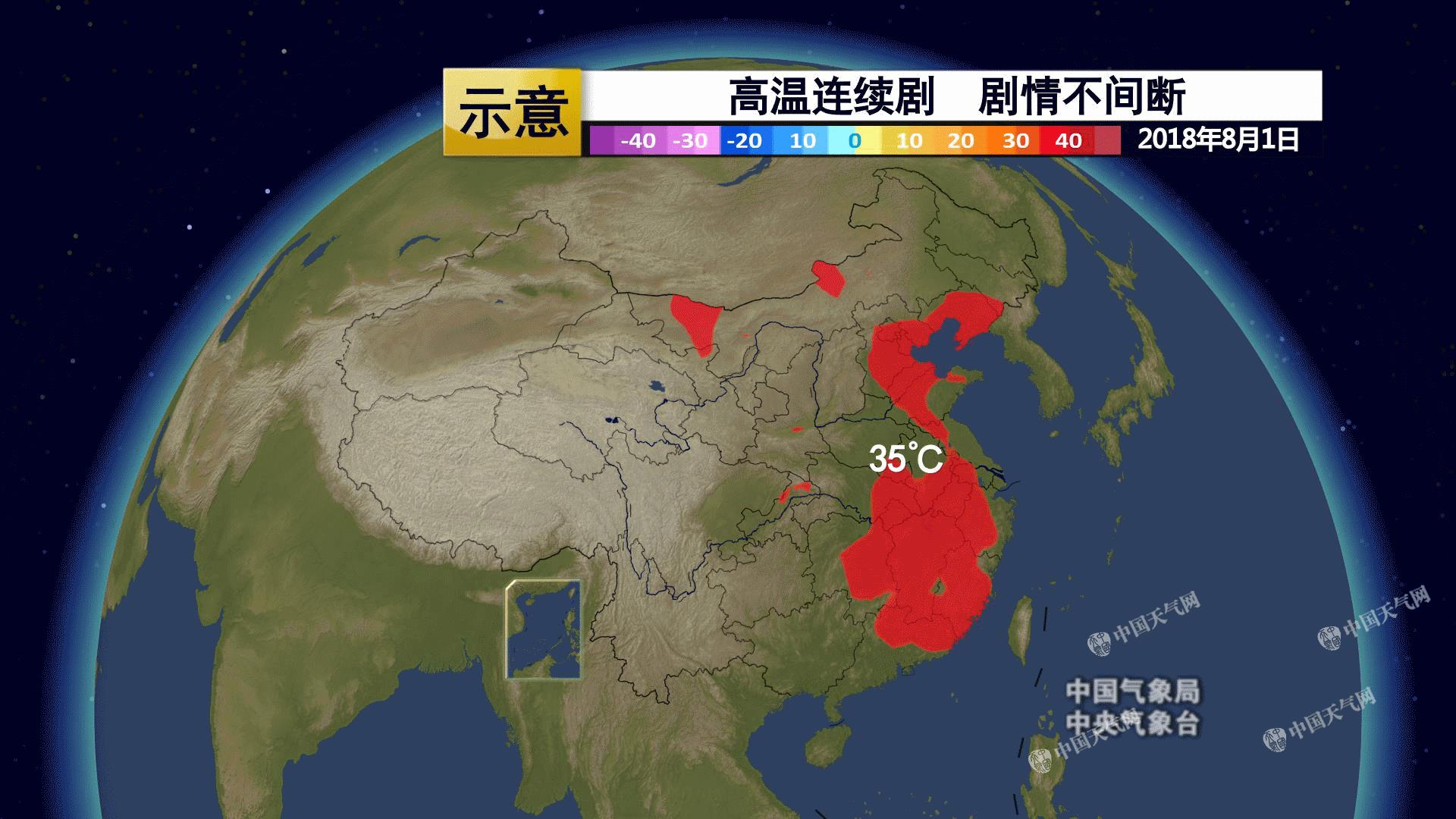
For many places in the south that have been suffering from high temperature for nearly half a month, we will enjoy a short coolness today and tomorrow. Affected by the rain and the wind and rain brought by the typhoon "Lark", the high temperature area in the south will continue to shrink today and tomorrow. Today, the western and southern parts of the south of the Yangtze River and most of southern China are out of the high temperature range. Tomorrow, there will be little high temperature left, only parts of northern Chongqing, northeastern Hubei and northwestern Jiangxi still have a small range of high temperature, and the rest areas will basically end the high temperature temporarily. In the area of Jiangsu, Zhejiang and Shanghai, due to the wind and rain brought by the typhoon "Lark", the maximum temperature in many places will drop to around 30℃ tomorrow.
Although the high temperature in the south has shrunk, the highest temperature in many places is still around 33℃, and the sultry feeling will continue. At the same time, the cooling time is very short. Starting from the 4th, the high temperature in the south will return strongly. At present, it is in the middle of the sky, and high temperature is the main theme. People in the southern region need to continue to prepare for heatstroke prevention and cooling.
Chinanews. com, March 14 th
Chen Mingzhong, director of the Rural Water Conservancy and Hydropower Department of the Ministry of Water Resources, said on the 14th that by the end of this year, the penetration rate of tap water in rural areas will increase by two percentage points to 92%, and the proportion of rural population covered by large-scale water supply projects will increase by three percentage points to 63%, greatly improving the level of rural water supply security.
On March 14th, the State Council Press Office held a press conference. At the meeting, a reporter asked: Rural drinking water safety is related to people’s livelihood and well-being. What progress has the Ministry of Water Resources made in this regard? And what key work will be carried out next? What new goals will be achieved?
Chen Mingzhong said that the Ministry of Water Resources, together with all localities and relevant departments, will fully implement the arrangements of the CPC Central Committee and the State Council and vigorously promote the construction of rural water supply projects. By the end of 2023, the penetration rate of tap water in rural areas will reach 90%, and 90% of farmers will drink tap water. The proportion of rural population covered by large-scale water supply projects will reach 60%, which means that the scale of water supply will reach tens of millions of people. There are several major advances:
First, in terms of ensuring the drinking water safety of rural people, we won the tough battle of rural drinking water safety and poverty alleviation, continued to consolidate the achievements of poverty alleviation and effectively connected with rural revitalization. By the end of 2020, the drinking water safety problem of 17.1 million poor people was completely solved, and the problem of drinking high-fluorine water and brackish water by 10.95 million rural people was properly solved. Continue to consolidate the achievements of poverty alleviation, and fully guarantee the drinking water safety of rural people in the process of coping with natural disasters such as drought in the Yangtze River Basin in 2022.
The second is to continue to promote the construction of rural water supply projects. In the past 10 years, the accumulated investment in project construction has reached 555.6 billion yuan, which has solved the drinking water safety problem of 130 million rural residents and consolidated and improved the security level of 510 million rural population. By the end of 2023, 5.63 million rural water supply projects have been built nationwide, and the water supply service population has reached 870 million.
Third, actively explore innovative financing models. At the same time of financial investment at all levels, we have guided local governments to make efforts to raise funds through multiple channels to carry out rural water supply projects. For example, in the past three years, a total of 304.9 billion yuan has been invested in rural water supply projects, of which local government special bonds, financial credit and social capital account for nearly 80%.
Fourth, establish and improve the management system, implement the "three responsibilities" and "three systems" for rural drinking water safety, comprehensively set the price and charge for rural centralized water supply projects, and the central government arranges maintenance subsidy funds to support local governments to strengthen the maintenance of rural water supply projects.
Chen Mingzhong said that rural drinking water safety guarantee is an important symbol of consolidating the achievements of poverty alleviation and promoting comprehensive rural revitalization. In the next step, the Ministry of Water Resources will guide all localities to comprehensively promote the high-quality development of rural water supply.
The first is planning guidance. Organize all localities to prepare high-quality development plans for rural water supply.
Second, taking the county as a unit, the whole county system implements the "3+1" standardized construction and management and protection mode. "3" means giving priority to urban-rural integration, large-scale centralized water supply construction, and implementing standardized construction and transformation of small water supply projects according to local conditions, so as to maximize the urban-rural water supply homology, the same network, the same quality, the same supervision and the same service. "1" is the management and protection mode to realize the unified management and full coverage of professional management in the county.
The third is to strengthen water quality assurance. In-depth implementation of the special action to improve the water quality of rural water supply, strengthen the protection of rural drinking water sources, improve the facilities and equipment for purification and disinfection, strengthen self-inspection and inspection of water quality, and ensure the safety of rural water supply.
The fourth is to firmly hold the bottom line. Explore the establishment of an emergency security system for rural water supply, improve the mechanism for rapid discovery and emergency response of rural water supply problems, and ensure that problems found are solved in time and dynamically cleared. Target By the end of this year, the penetration rate of tap water will increase by two percentage points to 92%, and the proportion of rural population covered by large-scale water supply projects will increase by three percentage points to 63%, greatly improving the level of rural water supply security.
]
CCTV News:On August 8, 2022, at 10: 00 a.m., the Shanghai Municipal Committee of the Communist Party of China held a press conference on the theme of "Ten Years in China" to introduce Shanghai’s construction of a socialist modern international metropolis with world influence since the 18th National Congress of the Communist Party of China.
Gong Zheng, deputy secretary of the Shanghai Municipal Party Committee and mayor, said that in the past ten years, Shanghai has kept in mind the important instructions of the General Secretary, such as "accelerating high-quality economic development", made great efforts to build a modern economic system, and its comprehensive strength has leapt to a new level. Shanghai’s GDP has continuously crossed two big steps of 3 trillion yuan and 4 trillion yuan, from 2.13 trillion yuan in 2012 to 4.32 trillion yuan in 2021, ranking fourth among cities in the world. Per capita GDP increased from $14,200 to $26,900, reaching the level of upper-middle developed countries. A modern industrial system with modern service industry as the main body, strategic emerging industries as the guide and advanced manufacturing industries as the support has been initially formed, and the added value of the tertiary industry has increased from 60% to more than 73% of the city’s GDP.
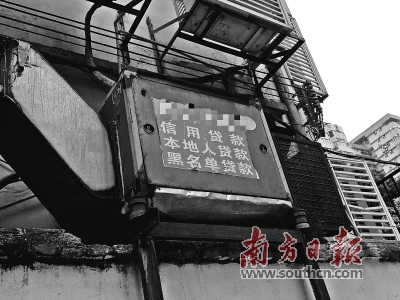
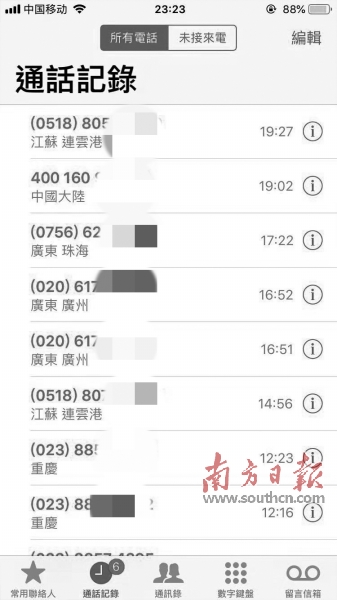
"Who can blame if the contracts are signed by themselves?" "It serves him right, who told him not to borrow money from the bank." In the eyes of many outsiders, everything that happened in the routine loan is incredible. The incoming victims seem to suddenly lose their minds: they choose riskier loan methods, sign unreasonable loan contracts, and are willing to pay high interest … …
How sweet is the bait in the trap? How deep is the routine of routine loan? The reporter unveiled the disguise of routine loan for you.
Since you want a loan, why not go to the bank?
"Can’t borrow, I want to be able to borrow money from the bank, why borrow online loans? I’m not stupid. " Iowa replied like this.
In order to realize the freedom of wealth at an early date, Iowa invested all her savings from several years’ work in P2P, digital currency and other projects. Unexpectedly, she lost all. In order to return to his capital, he chose to borrow and invest. The bank lending procedures were complicated and the approval time was long. He chose private lending in an eagerness to return to his capital, but he was caught in a routine loan.
Like Ahua, the reporter found that many victims of routine loans fell into the trap of routine loans because they could not switch from bank loans to private loans.
The reporter’s investigation found that ordinary people often need many procedures and certificates to get loans from formal commercial banks. For example, the personal network revolving loan provided by China Bank requires the borrower to have a fixed residence, a stable income, no bad credit record, and the willingness and ability to repay the loan principal and interest on schedule.
Even some "unsecured and unsecured" loan methods will have the most basic requirements for borrowers. For example, China Industrial and Commercial Bank’s "financing e-loan" requires borrowers to be over 18 years old and have no bad credit record.
These regulations of commercial banks are not difficult to understand, and everyone wants to lend money to reliable people. But what about those who want to get loans, but they don’t meet the requirements? How to meet their capital needs?
Private lending meets the needs of this group.
Compared with banks, private lending has many advantages: relaxed approval, few procedures, fast lending and flexible lending methods … … Some private lending companies have also introduced many preferential measures to encourage users to lend.
Xiao Wang, a graduate student of Jinan University, told reporters that she once used a loan product called "installment music". "My friend recommended it to me. He told me that he and I can get the 50 yuan phone bill as long as we download and register."
After Xiao Wang registered with her phone number, the platform immediately gave her an "interest-free coupon", with which she could pay no interest for one month. With this interest-free coupon, Xiao Wang borrowed 2000 yuan, and the money quickly arrived in her account. And as long as Xiao Wang can attract new customers, he can also get rewards such as cash-filled red envelopes and annual membership of video websites.
Private lending companies are more relaxed in the qualification examination of borrowers than banks, and only need ID cards and telephone numbers to borrow money. In the investigation, the reporter even saw advertisements that specifically provided "blacklisted loans". Blacklist users, that is, people who are blacklisted by banks because of credit problems and cannot obtain loans from banks, are also commonly known as "Lao Lai".
Routine loans are hidden in many private lending companies. Some people don’t know whether they signed a routine loan or an ordinary private loan.
There is something wrong with the contract. Why do you sign it?
The reporter’s investigation found that the contracts of routine loans were all designed by routine loan gangs, among which the most common ones are yin-yang contracts and blank contracts.
The so-called yin-yang contract, that is, the actual loan amount is different from the amount written on the loan. For example, the original loan was 50,000 yuan, but the contract was 100,000 yuan. Routine loan gangs usually use excuses such as company needs, business rules, including margin and liquidated damages to dispel borrowers’ doubts, saying that as long as the money is repaid on time, there will be no problem. This step is called "inflated debt".
When lending money, the routing loan gang will transfer 100,000 yuan into the borrower’s account according to the contract, but require the borrower to return 50,000 yuan in cash or transfer to a third party. This step is called "forging bank flow". The two steps, namely, the inflated loan amount of the Yin-Yang contract and the fixed evidence of the bank’s running water, have formally established private lending.
The blank contract refers to a contract with only format and no content. After signing this contract, the routine loan gang will fill it out according to their own needs.
No matter what kind of contract form, once a lawsuit occurs, it is written in black and white and has its own autograph, and the borrower has a hard time arguing.
But can’t the borrower notice the problem when signing such a contract?
The reporter learned that, first of all, many methods of routine loans are exactly the same as those of private usury. For example, in the folk usury, when the lender lends money to the borrower, the metropolis first deducts some money from the principal as the down payment interest.
It is also a "hidden rule" in the industry to help loan companies "walk away" and "swipe their bills" and improve each other’s credit and loan quota. Some borrowers have been exposed to private lending before, and they will think that this is a normal operation.
In addition, routine loan gangs are also very good at grasping the psychology of borrowers. Some borrowers have a weak awareness of legal risks. When the routine loan gang tells him that this is a "regulation", he believes it. Some people are eager to get loans, even if they realize that there is a problem, they have no time to take care of it; Others blindly trust the routine loan gang and feel that the other party will not harm themselves.
And most importantly, many people don’t read every clause in the contract carefully. In a questionnaire survey of routine loans initiated by reporters on the Internet, 58.33% of the respondents said that they "want to read carefully when signing the contract, but the provisions are too complicated to do". Another 6.25% of the respondents said that they would not read the provisions in the contract. Similar to their psychology, many borrowers signed the contract in such a muddle.
The debt is unreasonable, why should I pay it back?
"It is not enough to talk about the hardships of life without being forced to collapse by collection." This is the feeling of Iowa after being collected by high-frequency collectors.
All kinds of collection methods that you can think of or can’t think of are all staged in this stage called "Routine Loan".
The first appearance is the telephone collection.
During the investigation, the reporter received such a phone call, and the reporter was deeply impressed by the bad attitude and cold tone of the collection staff.
"Do you know Chen Mou? He borrowed a sum of money from us and didn’t pay it back. You asked him to pay it back quickly." According to the description of the other party, a man surnamed Chen borrowed a loan from their company and left the reporter’s phone number marked as his mother. When the man surnamed Chen called loans overdue, the collection staff immediately called his relatives and friends.
At this stage, not only the debtor, but anyone who appears in his address book will suffer an accident. In February this year, Mr. Tan, who lives in Panyu, Guangzhou, received a dunning call because his cousin borrowed 2,000 yuan from a loan platform and failed to pay it back. On the phone, Mr. Tan quarreled with the other party. I didn’t expect the other party to drop a sentence "You don’t want to use this phone" and hang up.
In the next few days, Mr. Tan’s mobile phone was constantly harassed by "calling you to death". Mr. Tan tried to block and blacklist, but it didn’t work. Finally, he had to turn off his mobile phone.
Telephone harassment is just a means. Sending photos of borrowers after PS, sending urns to borrowers’ parents, or even kidnapping and detaining borrowers directly, there are always more ways to set up loan gangs than you think.
In a typical case of routine loan announced by Guangdong Higher People’s Court, after the victim Liu borrowed from Tan Lin Company and got caught in routine loan, Tan Lin filed a civil lawsuit with the court on the grounds that Liu was in debt. In January 2010, after the opening of the court, Tan Lin directed the members of the organization to forcibly take Liu out of the court gate to the suburbs to threaten and beat him and force him to pay back the money.
Under a variety of collection methods, most debtors will try their best to pay off their debts under strong mental pressure. But you will never be able to pay off the arrears of routine loans.
Why is the routine loan in arrears still unfinished?
The amount owed is high and the interest on the loan is heavy, but it is still possible to pay it off in full. But in the routine loan, the debt is never finished.
In ordinary private lending, both parties don’t want to default, but the routine loan gang doesn’t need you to pay back the money at all, and doesn’t want you to pay back the money. Even if the victim takes the initiative to repay the money, the routine loan gang will actively pursue and create the opportunity of "default".
In a case in Sichuan, when the victim Mr. Lu went to repay the loan, he found that the company had moved away and the lender Zhang was in another place. Since then, Mr. Lu has turned around and found the company and Zhang, both of whom prevaricated on the grounds that they were not local or inconvenient. Until three months later, Zhang took the initiative to find Mr. Lu and informed him that the loan was overdue.
The purpose of doing this is because there are often high liquidated damages in routine loan contracts, which are calculated by hours or even minutes. In a case in Hangzhou, the victim’s repayment was overdue for 21 minutes, and the penalty required to pay was as high as 12,000 yuan.
Once you are unable to repay such a high fee, the routine loan gang will persuade you or threaten you with violence, asking you to settle the account, which means paying off the principal and interest owed in one lump sum.
In the questionnaire survey initiated by the reporter, what will you do if the arrears are overdue? On this issue, 41.67% of the respondents indicated that they would borrow another sum of money to pay back, 18.75% of the respondents chose to "pay back when they have money", and 39.58% of the respondents chose to "sell the goods to pay off the arrears".
However, the routine has reached this stage. Unless the borrower decides to call the police immediately, no matter which way it is, it can’t escape the routine of routine loan.
Borrow new or old? The loan of principal 1000 yuan, interest and overdue fees may be 2000 yuan, and because of the existence of "beheading interest", in order to repay this 3000 yuan, it is necessary to borrow 5000 yuan of new debt.
Don’t bite your teeth? Various means of collection will be staged in turn on the borrower.
Sell the property? Routine loan gangs are interested in the borrower’s property, which is exactly what they want.
The borrower can only watch the routine go to the last step and enter the "harvest" moment of the routine loan gang.
In this link, they either use the IOU as a voucher to force the victim to transfer ownership, or bring a lawsuit to the court, demanding judicial auction to ensure that all fraudulent means can be realized.
From the spectator’s point of view, the borrowers and borrowers of routine loans are not players of the same order of magnitude. Borrowers are often ordinary people who are in urgent need of loans and don’t know much about finance and law. Lenders, on the other hand, are criminals who are trying to make a fortune. They are not only rich in funds, but also have professionals to help them.
The unequal strength between the two sides makes the victims lose all their wealth once they step into the trap of routine loans.
Text/Photo: Reporter Wang Wei Intern Wang Xie Siqi
CCTV News:According to the website of the Supervision Department of the Central Commission for Discipline Inspection, there are currently 5 poverty-stricken counties and 300 poverty-stricken villages in Hainan Province, with a poverty-stricken population of 288,000, and 19 cities (counties, districts) except Sansha have poor people.
On July 7, Lan Foan, member of the Standing Committee of Hainan Provincial Party Committee and secretary of the Provincial Discipline Inspection Commission, said: "It is a hard task to get rid of poverty and strengthen the accountability of supervision and discipline in poverty alleviation. If you are a hundred miles away, the discipline inspection and supervision work must be carried out with the tenacity of dripping water and wearing stones, and then you can solidly promote the poverty alleviation work. " Discipline inspection and supervision organs at all levels in the province adhere to the problem orientation, and carry out special rectification around the key links of accurate poverty identification, accurate policy and accurate poverty alleviation to escort poverty alleviation.
Maintain a high-pressure situation and have zero tolerance for those who help the poor "cheese"
Speaking of the fact that the indicators of poor households were privately divided, the villagers in Wuxing Village, Hele Town, Wanning City were very angry: "It is disgusting for village cadres to give poverty alleviation indicators to their relatives, and the masses dare to speak out. The Municipal Commission for Discipline Inspection has done a good job, which is really Japanese!"
In June 2014, seven members of the "two committees" of Wuxing Village, Hele Town, Wanning City, including the secretary of the Party branch and the director of the village committee, discussed the indicators of poor households in the village, applied their relatives or themselves as poor households, and received funds and materials for poverty alleviation. In January this year, we received complaints from the masses, and the Municipal Commission for Discipline Inspection followed up and supervised them. At present, all seven people have been disciplined by the Party, and the Party branch of Wuxing Village is being reorganized according to the prescribed procedures.
Whoever does not take poverty alleviation seriously will be dealt with seriously. Discipline inspection and supervision organs at all levels in Hainan Province have established a clear orientation and played a "combination boxing".
Pressure is transmitted layer by layer, helping the responsibility to shoulder. The main person in charge of the Provincial Discipline Inspection Commission has interviewed 8 city and county party committee secretaries and 19 city and county disciplinary committee secretaries. Wenchang City reminded 34 main leaders of 17 towns and villages with problems such as poor implementation of precision poverty alleviation work and slow expenditure of poverty alleviation funds.
Highlight key counties and townships and implement key supervision. The clues in the field of poverty alleviation assigned by the Central Commission for Discipline Inspection and the Provincial Commission for Discipline Inspection are supervised by the Provincial Commission for Discipline Inspection. The Provincial Commission for Discipline Inspection listed embezzlement, misappropriation and seizure of special funds for poverty alleviation in the field of poverty alleviation as the primary task of the special treatment of letters and visits in 2017, and it was tracked and supervised by special personnel.
From January to July this year, the province investigated and dealt with 67 cases of unhealthy practices and corruption in the field of poverty alleviation, handling 117 people and punishing 99 people. The Provincial Commission for Discipline Inspection has reported 10 typical problems and 19 person-times in three batches.
Go deep into the grassroots front line and take the needs of the people to heart.
"Poverty subsidies are three or five hundred yuan a month, and kickbacks are also given. The CPC Central Committee’s policy of benefiting the people and helping the poor has gone wrong at some grassroots levels." Si Yajie, member of the Standing Committee of Qiongzhong Li and Miao Autonomous County Committee and secretary of the County Discipline Inspection Commission, introduced to reporters the experience of visiting poor households in the countryside: some fraudulent problems can’t be found if you don’t go out of the office to the grassroots.
Relevant persons in charge of the Provincial Commission for Discipline Inspection separately led teams to Dongfang, Changjiang, Chengmai and other places to understand the problems and weak links in the work of supervision, discipline and accountability in the field of poverty alleviation, and guide the city, county and township disciplinary committees to carry out special rectification.
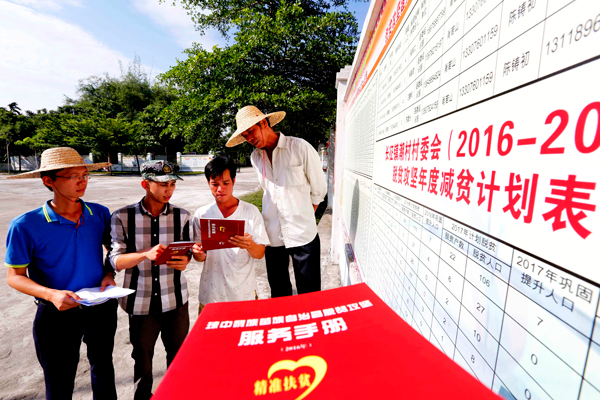
Discipline inspection and supervision cadres in Qiongzhong County explain poverty alleviation policies to poor households and collect clues about problems.
Lingshui Li Autonomous County set up a "through train of letters and visits for poverty alleviation supervision" to visit and receive visits, and selected towns and villages with concentrated poverty alleviation problems to carry out joint visits. At present, 82 people have been interviewed in 18 village committees, and 27 clues reflecting problems in poverty alleviation have been received.
Manage poverty alleviation funds well and effectively enhance people’s sense of gain.
Industrial poverty alleviation is an important link in the tough battle against poverty in Hainan Province. By the end of July 2017, the province had invested a total of 589 million yuan and implemented 1337 industrial poverty alleviation projects. How to ensure that every penny is spent on poor people has become an important issue for Hainan Province in tackling poverty.
In order to effectively control the source of poverty alleviation funds, the Provincial Commission for Discipline Inspection, together with the Department of Agriculture, the Audit Office and other departments, established a linkage mechanism for handling clues of violation of discipline and discipline in the field of poverty alleviation, and urged relevant competent departments to establish and improve the Interim Measures for Government Procurement of Poverty Alleviation Materials in Hainan Province and the Interim Measures for the Supply and Management of Poverty Alleviation Seedlings in Hainan Province, so as to plug loopholes from the source.
In accordance with the unified deployment of the Provincial Commission for Discipline Inspection, the municipal and county disciplinary committees actively organized and carried out special rectification of violations of discipline and discipline in the management and use of poverty alleviation funds in township industries.
In the black goat breeding project in Shang ‘an Township, Qiongzhong County, the purchase price of materials is higher than the market standard, and the seedlings are also unqualified. Mo Mingfei, the direct person in charge of the procurement of poverty alleviation materials, was put on file for review. Wang Darong, chairman of Shang ‘an Township People’s Congress, and Wang Taizhang, deputy head of the township, as leaders in charge, failed to perform their duties properly, and the county commission for discipline inspection held them seriously accountable.
Cctv newsAccording to China Weather Network, there will be continuous sunny, hot and high temperature weather in Beijing from June 14th to 17th, and the highest temperature may reach 38℃ on the 16th. Please pay attention to heatstroke prevention and sun protection when going out.
Yesterday in Beijing, it was mainly sunny and cloudy. At 15: 00 pm, the temperature in the southern suburb observatory was 33℃, and the temperature in the urban area was between 32.4~33.7℃, which was very hot.
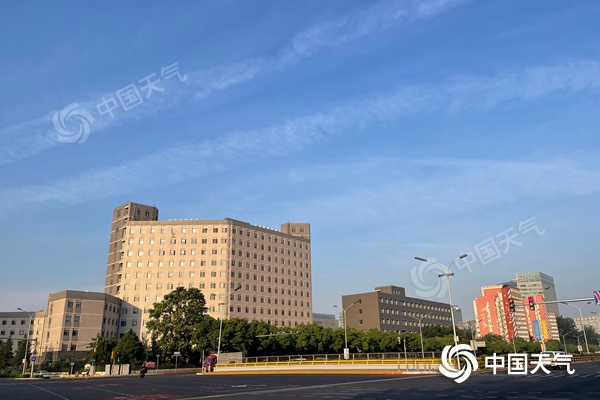
Beijing is clear online this morning. (Photo/China Weather Network Wang Xiao)
Today, the temperature in Beijing will rise and there will be high temperature weather. The Beijing Meteorological Observatory issued a weather forecast at 6 o’clock this morning. It is predicted that it will be cloudy and cloudy during the day, and the north will turn to the south wind for two or three levels, with the highest temperature of 35 C. It’s sunny at night, and the south turns to the north wind, with a minimum temperature of 21℃.
The sunny, hot and hot weather in Beijing will continue for three days from tomorrow, and the highest temperature can reach 36℃ and above. Among them, the highest temperature on the 16th may reach 38℃, which may set a new high this year, and the weather is very hot.
The meteorological department reminded that from today to the 17 th, Beijing’s high temperature continues, the ultraviolet rays are very strong, and the high temperature yellow warning signal is in effect. Please pay attention to heatstroke prevention and sun protection when going out; When the weather is dry and things are dry, pay attention to the safety of using fire; The road surface temperature is high, drivers and friends should avoid fatigue driving and strengthen the inspection and maintenance of vehicles.

Sina Auto News On October 29, 2019, Ferrari’s first mass-produced plug-in hybrid sports car, SF90 Stradale, was officially unveiled in China, and the price was announced at 3.988 million yuan. The new car is positioned as a flagship supercar, equipped with a hybrid system consisting of a 4.0T V8 turbocharged engine and three motors, with a maximum power of 1000Ps, a speed of 0-100km/h of only 2.5s and a maximum speed of over 340km/h..
1. Ferrari’s first externally rechargeable hybrid vehicle;
2. The maximum power of the hybrid system reaches 1000Ps, and it consists of a 4.0T V8 turbocharged engine and three motors;
3, 0-100km/h only takes 2.5s, and the maximum speed exceeds 340 km/h.



The F90 Stradale was built by a team of designers from Flavio Manzoni and Ferrari Styling Centre. The compact rear suspension, which is shorter than the front suspension, and the forward movement of the cockpit create a forward-leaning structure of the cockpit, highlighting the characteristics of the mid-engine The low center of gravity enables designers to reduce the cockpit area by 20 mm. Combined with the curved windshield, slender A-pillar and wide tread, it forms a fashionable car with perfect proportion. The compact bubble cockpit is like an aviation cockpit, and the design of moving forward greatly further highlights the tail flying arch shape in the same color as the car body.


The prominent feature of the rear of the vehicle is the high exhaust pipe, which is the result of optimizing the exhaust pipe layout. Because the position of transmission system in sports car is much lower than in the past, designers can reduce the height of the rear of the car. Another feature different from the traditional coupe is that the rear bumper no longer follows the line from the roof to the rear bumper. The baffle separated from the cooling grille embodies the separated modeling elements. The taillights also changed Ferrari’s iconic oval shape. The striking horizontal luminous ring makes the taillight more horizontal and reduces the visual height of the rear.


The interior of SF90 Stradale aims to create a cockpit that leads the new design direction, and will continue to be used in all Ferrari cars in the future. Designers have integrated future elements into the operation interface, created a wraparound cockpit inspired by aviation and highlighted the dashboard, and adopted a fully digital man-machine interface. This is the first time Ferrari has used a 16-inch digital high-definition screen tilted to the driver’s side in the central instrument cluster, which is easy for the driver to see, and adopts a F1-style surround cockpit. This is the first time that such screens have been used in Ferrari mass production sports cars.
The concept of "keeping an eye on the road and holding the steering wheel" has been promoting the continuous development of the man-machine interface of every Ferrari F1 racing car, and then gradually transferred to the road sports car version. The steering wheel of SF90 Stradale has been transplanted from the track perfectly, and a series of touch commands have been introduced, so that the driver’s hands can control all parts of the sports car without leaving the steering wheel, opening a new era of control. Traditional control devices include headlight controller on steering wheel, windshield wiper, signal lamp and classic Manettino driving mode.

In addition to the man-machine interface with a new concept, another obvious change in the cockpit is the design of the central control area. The slender shape is lined with control buttons from F1, which is probably the most classic design element in recent generations of Ferrari models. All of them have been redesigned, supplemented by modern metal panels, which can not help but remind people of the same classic prancing horse design, traditional shift lever.

For the first time, Ferrari offers two versions for customers to choose from, including the standard version and more sporty configuration. The Assetto Fiorano configuration model adopts a greatly optimized and upgraded configuration, including a special multi-modal shock absorber based on GT racing car, as well as lightweight parts made of high-performance materials such as carbon fiber materials (doors, floor) and titanium materials (springs, complete exhaust pipes), which successfully reduced the body weight by 30 kg. Other differences include the carbon fiber rear spoiler, which can generate 390 kilograms of downforce when the speed reaches 250 kilometers per hour. The Assetto Fiorano model is equipped with Michelin Pilot Sport Cup second-generation tires specially designed to improve the performance on dry roads on the track. Compared with the tires used in the standard model, the tread texture is softer and the surface grooves are less.

SF90 Stradale is Ferrari’s first plug-in hybrid vehicle. The power system consists of a 4.0T V8 turbocharged engine and three motors, of which two motors are installed on the front axle and can work independently, and the third motor is installed at the rear of the vehicle between the engine and the gearbox. The maximum output power of this hybrid system is as high as 1000Ps.

The 7.9kWh high-performance lithium-ion battery supplies power to three motors, which ensures that in eDrive pure electric mode, only the front axle motor can be started to meet the cruising range requirement of 25 kilometers. When the engine stops working, two independent motors will help the new car achieve a speed of up to 135 km/h and a maximum longitudinal acceleration of no more than 0.4 g. Reverse gear can only be used in eDrive mode, which also means that the new car can drive at a low speed without starting the V8 engine. The organic integration of front-axle motor and ejection starting technology helps this brand-new sports car to accelerate at 0-100km/h in only 2.5s, and at 0-200km/h in only 6.7s.

Through the new eManettino control knob installed on the steering wheel, the driver can freely switch between four different power control modes: eDrive, Hybrid, Performance and Qualifying. "eDrive mode" is suitable for congested urban road conditions, and the system will be driven by electricity as much as possible; The default "hybrid power mode" can realize the optimal presentation of system energy efficiency through power distribution; In the "performance mode", the engine is always working, and more emphasis is placed on charging the battery, rather than optimizing efficiency, in order to bring the driver a freewheeling driving experience; "Qualifying mode" can realize the maximum power output and release the motor output power to the maximum extent.
In terms of transmission, SF90 Stradale is matched with an 8-speed wet dual-clutch gearbox and adopts a four-wheel drive system. In addition, the new car also provides an electronic traction control system, a brake-by-wire system with anti-lock braking and electronic braking force distribution, and a torque vector distribution system, which optimizes the overall grip of the vehicle and brings stronger and more balanced performance.

Ferrari SF90 Stradale with beautiful proportion and strong performance will open a new chapter in the electrification transformation of Ferrari brand. Although the engine is still the main output unit of the whole plug-in hybrid system in terms of power parameters, the formed multi-motor hybrid system architecture and control system are the foundation of Ferrari’s future deeply electrified models.